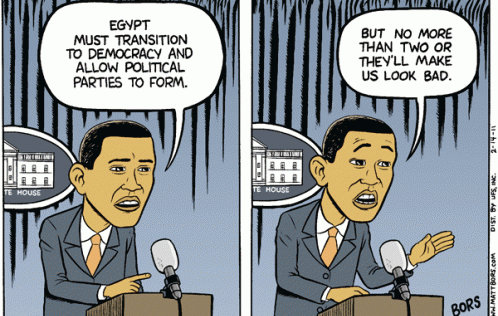The Unappealing Prospect of ‘Western Democracy’
 The first thing any American must admit when voicing his opinion about the Middle East is that he has, what can only can be understood as, a psychological discomfort about the whole royal thing. Although I find the notion of royalty among the Anglo Saxons vaguely charming as well as historically credible through my Grimm’s fairy tale point of view, I can’t help but feel that the Arab version is somewhat pretentious. I attribute this prejudice to my Anglo-centric upbringing further compounded through a significant portion of my childhood watching the Wonderful World of Disney and Johnny Weissmuller playing Tarzan in the 50’s and 60’s.
The first thing any American must admit when voicing his opinion about the Middle East is that he has, what can only can be understood as, a psychological discomfort about the whole royal thing. Although I find the notion of royalty among the Anglo Saxons vaguely charming as well as historically credible through my Grimm’s fairy tale point of view, I can’t help but feel that the Arab version is somewhat pretentious. I attribute this prejudice to my Anglo-centric upbringing further compounded through a significant portion of my childhood watching the Wonderful World of Disney and Johnny Weissmuller playing Tarzan in the 50’s and 60’s.
In truth, some Gulf Kingdoms appear to run better than the so called democracies that criticize them. Compared to the US, though there is a problem with unemployment, nationals have free health care, petrol that cost less than water, Education and other entitlements that are the envy of the Arab and so called modern world. Kingships such as those which exist in the Emirates and Saudi were formed through tribal alliances. Zaid (founder of the UAE) and Abdul Aziz (the founder of the kingdom of Saud) intermarried with the families of tribal leaders to unite the tribes and thereby their respective kingdoms .
Since all tribes have a royal family component, all nationals have permanent representation and standing in the workings of the government. In Saudi and the UAE, when the king rules, he must take into consideration the royal branches created when uniting the kingdom in the first place. In the Saudi royal family (about 22,000 and counting) familial ties carry safe guards to keep outside interest from exerting any noticeably defining control over what goes on in the kingdom. Though money plays a big role in what happens in the Arab world, the tribal culture (with Islam being an inseparable ingredient of it) is still greater.
An illustration of this point regarding the nature of leadership in his country can be seen in King Abdullah of Saudi Arabia 2005 ABC News interview with Barbara Walter, where he professes openly he must defer to his constituency (“my people”) before he could make a decision:
WALTERS: You cannot just make a decree that women can drive? You are the King!
ABDULLAH: I value and take care of my people as I would my eye.
WALTERS: Is that an answer?
ABDULLAH: Yes, I respect my people. It is impossible that I would do anything that is not acceptable to my people.
Protest is against the law in Saudi and the UAE, maybe because,technically, the tribal system makes it unnecessary. Despite the imperfections in their systems, Saudi and Emirati nationals have and continue to enjoy a good standard of living and security considered unfeasibly under current conditions in most western countries.
America, on the other hand, attempts to govern based on secular associations; which are in essence, is rule by the struggle of, more often than not, the domination of a competing special interest. Since religious and familial influences have been outlawed, money has become the most influential factor in government—meaning, whoever has the most of it runs the show and decides what is lawful or not.
The only thing the one percenters in the US have to take into consideration is whether they should wear Armani or Polo. Their accountability for and responsibility to American citizens or their country is no more concern to him than freezing temperatures on Mars. This may explain why despite all the express concern about non-democracies (and I suspect to their lack of unbridled access to the resources thereof), the rich of America today have destroyed the greatness of America and disenfranchised its people for the sake of their personal fortunes. This is why Wall Street and not Main Street appear to be calling the shots in the US and those who have a problem with it, at the moment, are subject to arrest. Despite the propaganda to the contrary, in America’s comparative short life as a government, this has all too frequently been the case.
Americans must protest and cause civil unrest to get their grievances addressed because, in regard to the present schematics of government, the 99% are just the poor smucks that can’t afford the price of the services offered.
Just goes to show you, just because it is different doesn’t mean it is wrong.



5 Responses to The Unappealing Prospect of ‘Western Democracy’
You must be logged in to post a comment Login